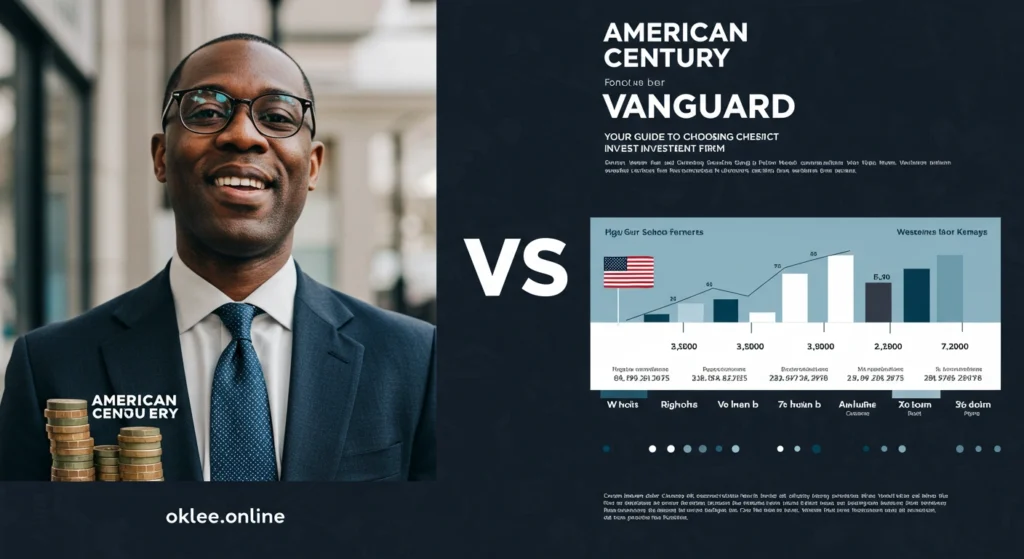When it comes to investing, choosing the right firm can impact your returns just as much as the market itself. American Century Investments and Vanguard are two well-known names, each with strong reputations—but they take very different approaches to helping you grow your money.
If you’re looking for the right place to park your cash, invest for retirement, or build a long-term portfolio, this guide will give you a clear picture of what each firm offers—and which one might be a better fit for your goals.
Quick Overview
| Feature | American Century | Vanguard |
|---|---|---|
| Founded | 1958 | 1975 |
| Ownership | Privately held (profits support medical research) | Client-owned (investor-owned structure) |
| Fund Types | Actively managed & passive | Primarily passive index funds |
| Expense Ratios | Mid to high | Very low |
| Investment Minimums | $2,500 (many funds) | $1,000 (index funds), $3,000 (admiral shares) |
| Digital Tools & Support | Moderate | Extensive |
1. Investment Philosophy
American Century:
American Century focuses mostly on actively managed funds, which means their in-house analysts and fund managers aim to beat the market. They use a variety of strategies and research techniques to try and select stocks that will outperform.
Pros:
- Potential for outperformance
- Tailored strategies based on sector and market trends
Cons:
- Higher fees
- Not all active funds beat their benchmarks
Vanguard:
Vanguard is best known for its passive investing approach. It pioneered the low-cost index fund and believes in long-term, diversified investing without trying to time the market.
Pros:
- Ultra-low fees
- Strong long-term performance
- Ideal for buy-and-hold investors
Cons:
- Limited active fund options (though they do exist)
- Less opportunity to “beat” the market in strong years
Winner: Depends on your style. If you want simplicity and low cost, go Vanguard. If you want active management and are okay paying for it, American Century is your bet.
2. Fund Selection
American Century:
- Offers more than 80 funds, including growth, value, equity income, and sector-based strategies
- Well-known funds: Focused Dynamic Growth (ACFOX), Ultra Fund (TWCUX), Diversified Bond (ADFIX)
- Strong presence in retirement accounts and 529 plans
Vanguard:
- Offers over 190 funds, including some of the most widely used index products globally
- Flagship funds: Vanguard 500 Index Fund (VFIAX), Vanguard Total Stock Market (VTSAX), Vanguard Total Bond Market (VBTLX)
- Huge variety in target-date funds and ETFs
Winner: Vanguard, especially for DIY investors or anyone wanting maximum diversification.
3. Fees & Expenses
American Century:
- Expense ratios generally range from 0.65% to over 1%
- No-load funds available, but some share classes charge sales loads
- Fees can eat into returns, especially in flat or down markets
Vanguard:
- Most index funds have expense ratios below 0.10%
- Some of the lowest fees in the entire industry
- Transparent pricing, no unnecessary add-ons
Winner: Vanguard, hands down. Lower fees mean more money stays in your portfolio.
4. Performance & Returns
American Century:
- Several top-performing funds, especially in sectors like growth and small-cap
- Example: Focused Dynamic Growth Fund (ACFOX) has outperformed its benchmark in many years
- Performance depends heavily on the fund manager
Vanguard:
- While index funds don’t “beat” the market, they match it at a very low cost
- Vanguard’s active funds (like Vanguard Primecap) also have strong long-term results
- Less variability across portfolios
Winner: Tie. If you’re betting on active manager skill, American Century may have upside. If you want reliable market-matching returns, go with Vanguard.
5. Minimum Investments
American Century:
- Most mutual funds require $2,500 minimum, which might be high for beginners
- IRAs and 529 plans may offer lower thresholds
Vanguard:
- Index funds usually require $1,000 to $3,000
- ETFs can be bought for as little as one share (great for beginners)
Winner: Vanguard is more beginner-friendly, especially through ETFs.
6. Account Options & Tools
American Century:
- Offers taxable accounts, IRAs, 529s, and business retirement plans
- Website is clean but not as robust in terms of analytics or financial planning tools
- Some automated advice available
Vanguard:
- Wide range of account types: brokerage, IRAs, trusts, 401(k) rollovers, etc.
- Known for extensive tools for retirement planning, asset allocation, and risk analysis
- Also offers Vanguard Personal Advisor Services for clients needing more help
Winner: Vanguard, especially for long-term planners or those needing digital guidance.
7. Customer Experience
American Century:
- Offers decent phone support and basic account management tools
- Not as user-friendly as larger firms like Fidelity or Schwab
- Email support and educational content available
Vanguard:
- Known for solid customer service and deep educational content
- Mobile app and online platform are functional but not flashy
- May feel outdated for younger, tech-focused investors
Winner: Toss-up. Vanguard wins for content and depth. American Century has a more personal feel but less infrastructure.
Final Verdict: American Century vs Vanguard
| Category | Winner |
|---|---|
| Low Fees | Vanguard |
| Fund Performance | Tie |
| Investment Variety | Vanguard |
| Active Management | American Century |
| Ease for Beginners | Vanguard |
| Digital Tools | Vanguard |
| Customer Experience | Tie |
So, Which Should You Choose?
Choose Vanguard if:
- You want low-cost, long-term investing
- You prefer index funds or ETFs
- You’re focused on retirement and wealth-building with minimal hassle
Choose American Century if:
- You believe in active management and are willing to pay for it
- You’re looking for specific sector strategies or niche funds
- You’re okay with higher minimums and some complexity

Final Thoughts
There’s no one-size-fits-all answer in this investment firm comparison. Both American Century and Vanguard are trustworthy, well-established firms. Your choice depends on your goals, your budget, and how much involvement you want in managing your portfolio.
If you’re looking for simple, low-cost investing, Vanguard is the clear winner. But if you’re after higher-touch, actively managed funds with a proven team behind them, American Century has something to offer too.
Want help comparing mutual funds side by side?
Download our free Fund Comparison Toolkit at oklee.online—or sign up for weekly investment tips, reviews, and trend alerts.



